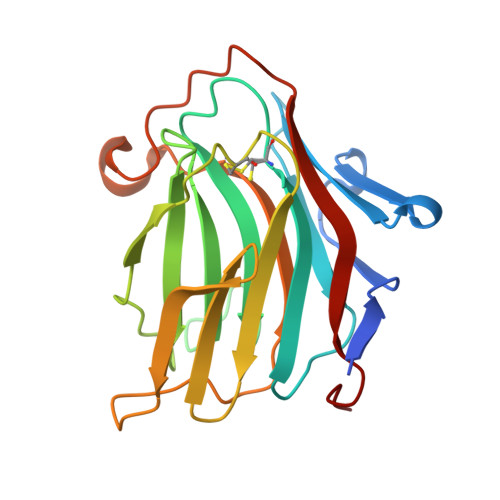Crystallographic insight into the evolutionary origins of xyloglucan endotransglycosylases and endohydrolases.
McGregor, N., Yin, V., Tung, C.C., Van Petegem, F., Brumer, H.(2017) Plant J 89: 651-670
- PubMed: 27859885
- DOI: https://doi.org/10.1111/tpj.13421
- Primary Citation of Related Structures:
5DZE, 5DZF, 5DZG, 5SV8 - PubMed Abstract:
The xyloglucan endotransglycosylase/hydrolase (XTH) gene family encodes enzymes of central importance to plant cell wall remodeling. The evolutionary history of plant XTH gene products is incompletely understood vis-à-vis the larger body of bacterial endoglycanases in Glycoside Hydrolase Family 16 (GH16). To provide molecular insight into this issue, high-resolution X-ray crystal structures and detailed enzyme kinetics of an extant transitional plant endoglucanase (EG) were determined. Functionally intermediate between plant XTH gene products and bacterial licheninases of GH16, Vitis vinifera EG16 (VvEG16) effectively catalyzes the hydrolysis of the backbones of two dominant plant cell wall matrix glycans, xyloglucan (XyG) and β(1,3)/β(1,4)-mixed-linkage glucan (MLG). Crystallographic complexes with extended oligosaccharide substrates reveal the structural basis for the accommodation of both unbranched, mixed-linked (MLG) and highly decorated, linear (XyG) polysaccharide chains in a broad, extended active-site cleft. Structural comparison with representative bacterial licheninases, a xyloglucan endotranglycosylase (XET), and a xyloglucan endohydrolase (XEH) outline the functional ramifications of key sequence deletions and insertions across the phylogenetic landscape of GH16. Although the biological role(s) of EG16 orthologs remains to be fully resolved, the present biochemical and tertiary structural characterization provides key insight into plant cell wall enzyme evolution, which will continue to inform genomic analyses and functional studies across species.
- Michael Smith Laboratories, University of British Columbia, 2185 East Mall, Vancouver, BC, V6T 1Z4, Canada.
Organizational Affiliation:


















